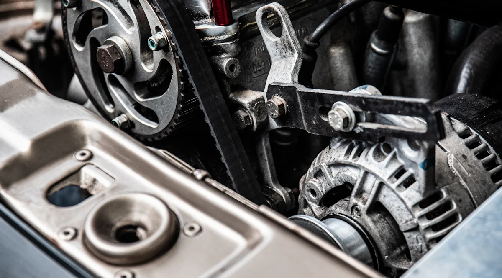Steel is the backbone of automotive manufacturing, playing a vital role in ensuring the durability and strength of vehicles. This blog aims to delve into the significance of steel in the automotive industry, shed light on prevalent steel varieties used in vehicles, and provide insights into why steel remains a top choice for manufacturers worldwide.
The Role of Steel in Automotive Industry
Steel stands as the cornerstone of the automotive industry, embodying a material that ensures vehicles possess the necessary durability and strength to navigate roads worldwide. Its significance cannot be overstated, with steel being a fundamental element in constructing cars, trucks, and motorcycles. The utilization of common automotive steel types underscores the commitment to producing reliable and robust vehicles that meet consumer demands for safety and longevity.
Importance of Steel
Durability and Strength
The durability and strength of steel are unparalleled in the automotive realm. With advancements like high-strength low-alloy (HSLA) steel, vehicles can withstand various stresses while maintaining their structural integrity. This durability translates into enhanced safety for drivers and passengers alike, ensuring that vehicles can endure impacts and collisions with resilience.
Cost-Effectiveness
One of the most compelling aspects of steel in automotive manufacturing is its cost-effectiveness. Unlike other materials that may offer similar properties, steel remains a highly affordable option for mass production. This affordability enables manufacturers to create vehicles at scale without compromising on quality or safety standards, making it a preferred choice across the industry.
Common Automotive Steel
Prevalence in Vehicles
The prevalence of common automotive steel in vehicles is evident through its widespread use across different components. From the chassis to body panels, steel forms the backbone of vehicle structures due to its exceptional properties. Manufacturers rely on steel for its versatility and reliability, ensuring that every part contributes to the overall performance and safety of the vehicle.
Compatibility with Manufacturing Processes
Steel’s compatibility with manufacturing processes further solidifies its position as a primary material in automotive construction. Whether shaping intricate designs or forming complex parts, steel adapts seamlessly to various fabrication techniques. This compatibility streamlines production workflows, allowing manufacturers to efficiently create high-quality vehicles that meet stringent industry standards.
Types of Common Automotive Steel
Galvanized Steel
Galvanized Steel is a prevalent choice in the automotive industry, characterized by its protective zinc coating that enhances durability and longevity. This type of steel undergoes a galvanization process, where a layer of zinc is applied to prevent corrosion and rust formation. The definition of galvanized steel lies in its ability to resist environmental factors, making it ideal for various vehicle components.
Definition and Properties
- Galvanized steel boasts exceptional corrosion resistance, ensuring that vehicles remain structurally sound even in harsh conditions.
- Its zinc coatingacts as a sacrificial layer, protecting the underlying steel from oxidation and maintaining the integrity of automotive parts.
Applications in Vehicles
- Chassis Components: Galvanized steel is commonly used in chassis construction due to its strength and corrosion-resistant properties.
- Body Panels: Manufacturers rely on galvanized steel for body panels to enhance the vehicle’s exterior durability.
- Exhaust Systems: The high-temperature tolerance of galvanized steel makes it an ideal choice for exhaust system components.
Carbon Steel
Carbon Steel stands out as a versatile option for automotive applications, known for its robust nature and cost-effectiveness. This type of steel contains varying levels of carbon, influencing its strength and hardness. In the automotive sector, carbon steel finds extensive use in structural components that require durability and impact resistance.
Definition and Properties
- Carbon steel’s carbon contentcontributes to its strength, making it suitable for heavy-duty vehicle parts.
- Its malleabilityallows manufacturers to shape carbon steel into intricate designs without compromising structural integrity.
Applications in Vehicles
- Frame Construction: Carbon steel frames provide stability and support to the vehicle structure, ensuring passenger safety.
- Suspension Components: The impact-resistant nature of carbon steel makes it an ideal choice for suspension systems that endure constant stress.
- Fasteners and Bolts: Due to its high tensile strength, carbon steel fasteners secure various vehicle parts effectively.
Stainless Steel
Renowned for its premium quality and aesthetic appeal, Stainless Steel represents a high-value material utilized across diverse automotive applications. Unlike other types of common automotive steels, stainless steel requires minimal processing while offering superior corrosion resistance and longevity.
Definition and Properties
- Stainless steel’s inherent resistance to corrosionensures that vehicles maintain their appearance over extended periods.
- Its durabilitymakes stainless steel a preferred choice for critical components that require long-term reliability.
Applications in Vehicles
- Wheel Rims: Stainless steel wheel rims enhance both visual appeal and structural integrity on vehicles.
- Exhaust Systems: The heat-resistant properties of stainless steel make it an ideal material for exhaust system components.
- Automobile Frames: Manufacturers utilize stainless steel in frame construction due to its strength-to-weight ratio benefits.
High-Strength Low-Alloy (HSLA) Steel
Definition and Properties
- High-Strength Low-Alloy (HSLA) Steelis a specialized type of steel known for its exceptional strength and durability, making it a preferred choice in automotive manufacturing. This steel variant contains small amounts of alloying elements, such as copper, nickel, or chromium, which enhance its mechanical properties without compromising on formability.
- The yield strengthof HSLA steel ranges from 250 to 600 MPa, providing vehicles with the necessary structural integrity to withstand various road conditions and loads. This increased strength ensures that automotive components made from HSLA steel exhibit superior performance and longevity compared to traditional carbon steels.
- Manufacturers favor HSLA steel for its high tensile strengthand impact resistance, allowing them to design lighter yet robust vehicle structures. This lightweight characteristic contributes to improved fuel efficiency and overall vehicle performance while maintaining safety standards.
Applications in Vehicles
- Safety Components: HSLA steel finds extensive use in safety-critical components like side impact beams and door reinforcements due to its high-strength properties. These components enhance passenger protection by absorbing energy during collisions.
- Structural Elements: Vehicle frames and chassis benefit from the superior strength of HSLA steel, ensuring structural stability under dynamic loads. The use of HSLA steel in these elements enhances the overall rigidity of the vehicle while reducing weight.
- Suspension Systems: Automotive suspension systems rely on the resilience of HSLA steel to provide optimal handling and ride comfort. The high fatigue resistance of this steel type ensures that suspension components can endure continuous stress without compromising performance.
- Powertrain Parts: Various powertrain parts, such as gears and shafts, utilize HSLA steel for its wear resistance and durability. The ability of this steel variant to withstand friction and mechanical stresses makes it an ideal choice for critical drivetrain components.
Incorporating High-Strength Low-Alloy (HSLA) Steel into automotive manufacturing exemplifies the industry’s commitment to innovation by leveraging advanced materials that enhance vehicle performance, safety, and sustainability.
Advantages of Using Steel
Durability
Steel’s durability is a fundamental aspect that enhances the longevity and reliability of vehicles. The development of Advanced High Strength Steels (AHSS), such as Dual Phase (DP) steel, has revolutionized the automotive industry by providing solutions to maintaining excellent mechanical properties while ensuring the necessary ductility for producing press-formed parts. This innovation underscores steel’s ability to withstand various stresses and impacts, making it an indispensable material in vehicle construction.
Cost-Effectiveness
One of the primary advantages of using steel in automotive manufacturing is its cost-effectiveness. High Strength Low Alloy (HSLA) steels, specifically developed for the automotive sector, offer a lightweight solution without compromising on strength. Manufacturers benefit from the affordability of steel while meeting stringent industry requirements for durable and safe vehicles. Steel’s versatility in fabrication processes ensures that components can be produced efficiently and economically, contributing to overall cost savings in vehicle production.
Ease of Manufacturing
Steel’s malleability and formability make it a preferred material for shaping different body parts of vehicles. With its lightweight characteristics, manufacturers can achieve the desired product for creating lightweight vehicles without sacrificing structural integrity. The introduction of new advanced high-strength steel (AHSS) grades further exemplifies steel’s adaptability to meet evolving industry demands. By leveraging steel’s ease of manufacturing, automakers can innovate and design vehicles that prioritize safety, performance, and sustainability while remaining cost-effective.
For the automotive industry, high-quality steel is closely related to factors such as body quality, safety performance, and so on. Therefore, choosing high-quality steel is the first step to success.
Qingdao Sunrise New Materials Co., Ltd. (referred to as “Sunrise New Materials”) is an international and professional supplier of steel and non-ferrous metal raw materials. We are committed to providing reliable and customized supply solutions for steel and metal products to global users. As a one-stop supplier, Sunrise New Materials has become the preferred supplier of steel and fiberglass products for tens of thousands of customers worldwide. We have a strong supply chain network, solid professional knowledge, and reliable services.
Sunrise New Materials offers a wide range of steel products, including automotive steel. Automotive steel is a specialized type of steel used in the manufacturing of automobiles. It is designed to meet the specific requirements of the automotive industry, such as high strength, durability, and corrosion resistance.
Sunrise New Materials sources automotive steel from reputable domestic and foreign steel mills, such as Baosteel, Taiyuan Iron and Steel, and POSCO. These partnerships ensure that customers receive high-quality automotive steel that meets industry standards.
With their expertise in the steel industry, Sunrise New Materials understands the importance of providing reliable and timely delivery. We have established multiple large warehouses in major domestic ports to ensure that automotive steel and other products are delivered to customers in a timely manner.
By adhering to the corporate spirit of “being a person, building a business, and serving the country with the will of steel,” Sunrise New Materials actively contributes to the high-end transformation of steel intelligent manufacturing. We focus on providing automotive steel and other steel products that are of high quality, environmentally friendly, and contribute to the overall development of the steel industry worldwide.
In conclusion, Qingdao Sunrise New Materials Co., Ltd. is a trusted supplier of automotive steel and other steel products. With our strong supply chain network, solid professional knowledge, and commitment to customer satisfaction, we have become a preferred choice for customers worldwide.








